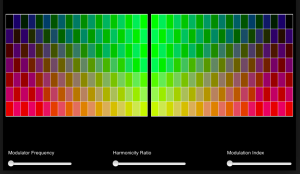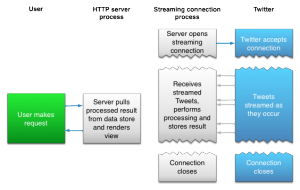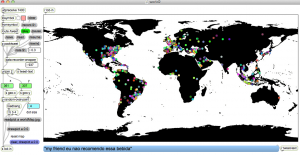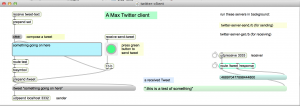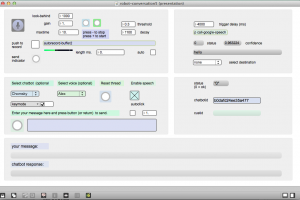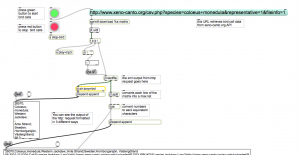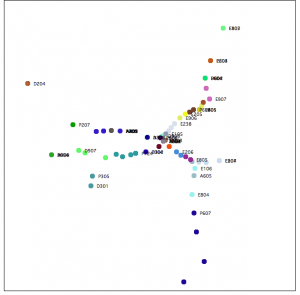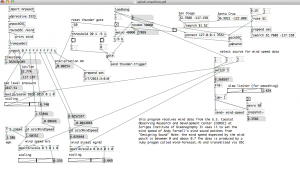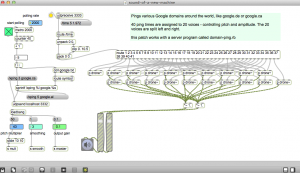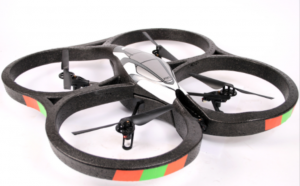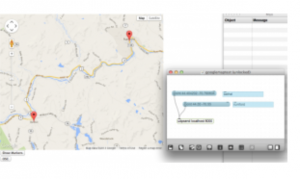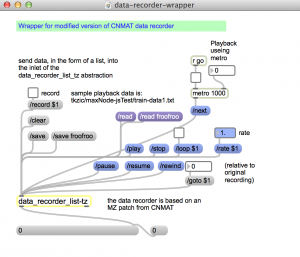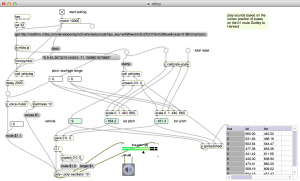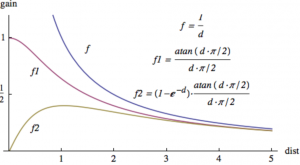By Olaf Matthes
How to import Max 5 patches into Pd
There is no easy way. Here are suggestions.
At Create Digital Noise
http://createdigitalnoise.com/discussion/152/need-help-trying-to-import-maxmsp-5-patchers-into-pd
Processing, libPd, Pd
notes
Zengarden Pd stand alone runtime
Internet sensors projects
overview
A series of projects that use Internet API’s for interactive media projects.
updated 2/14/2021.
Projects have been tested on Max8 and Mac OS Catalina – except where noted. Other dependencies are are listed on individual project pages.
My goal is to show a variety of methods to get data to and from Max. API’s come and go, as do the libraries that support them.
download
internet-sensors is on Github at: https://github.com/tkzic/internet-sensors
Each project is in a separate folder.
authorization
Some projects require passwords and API-keys from providers.
For example, for the ‘Twitter streaming API in Max’ project you’ll need to set up a Twitter application from your account to get authorization credentials.
For projects that need authorization usually you’ll just need to modify the patches/source code with your user information – as directed in the instructions. The API keys embedded in the code will not work unless specifically mentioned, like with the Google speech API.
help
API’s used in the projects change fairly often. So there’s no guarantee they’ll work. If you find problems or have ideas – please post to them to the github repository. Or email me at [email protected].
projects
1. Twitter streaming API in Max (FM, php, curl, geocoding, [aka.speech], Soundflower (optional), Morse code, OSC, data recorder, Twitter v1.1 API, Twitter Apps, Oauth)
https://reactivemusic.net/?p=5786
2. Sending tweets from Max using curl ([sprintf], [aka.shell], xively.com API, zapier.com API, JSON, javascript Twitter v1.1 API, Oauth)
deprecated 2/11/2021 – old project link here: https://reactivemusic.net/?p=5447
New! – use the project above to send tweets from using a Fisher Price “Little Tikes” piano: https://reactivemusic.net/?p=6993
4. Speech to text in Max (Google speech API, JSON, javascript, sox, Twitter v1.1 API, Oauth)
Note: Send Tweets using speech as well.
https://reactivemusic.net/?p=4690
5. A conversation with a robot in Max (Google speech API, sox, JSON, pandorabots API, python, [aka.speech]
https://reactivemusic.net/?p=9834
7. Playing bird calls in Max (xeno-canto API, [jit.uldl], [jit.qt.movie])
https://reactivemusic.net/?p=4225
8. Soundcloud API in Max (node.js)
https://reactivemusic.net/?p=20120
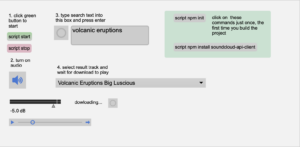
9. Real time train map using Max and node.js (XML, JSON, OSC, data recorder, web sockets, Irish Rail API)
https://reactivemusic.net/?p=5477
10. stock market music in Max (OSC, netcat, php, mysql, html, javascript, Yahoo API, linux)
…updates in progress…
https://reactivemusic.net/?p=12029
11. Using weather forecast data to drive weather sounds in Pure Data (ruby, OSC, JSON, openweathermap API, “Designing Sound” by Andy Farnell)
https://reactivemusic.net/?p=5846
… updates in progress…
12. Using ping times to control oscilators in Max (Mashape ping-uin API, ruby, OSC, JSON)
https://reactivemusic.net/?p=5945
13. Spotify Segment analysis player – sonification of audio analysis data from Spotify (echo nest) API, node, Max/MSP)
https://reactivemusic.net/?p=20096
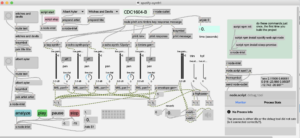
14. Quadcopter AR_drone – Fly a quadcopter using Max – with streaming Web video. ( node.js, AR_drone, Google Chrome, Osc, Max/MSP)
deprecated 2/14/2021 – old project link: https://reactivemusic.net/?p=6635
15. Adding markers to Google Maps in Max – ( node.js, ruby, Google Chrome, Osc, Max/MSP, websockets, Google Maps API, Jquery, javascript)
deprecated 2/14/2021 – old project link: https://reactivemusic.net/?p=11412
16. Max data recorder – Record and play back streams of data simultaneously at various rates
https://reactivemusic.net/?p=8053
17. MBTA bus data in Max – Sonification of Mass Ave buses, from Harvard to Dudley
… updates in progress…
https://reactivemusic.net/?p=17524
Making musical apps in libpd
Making Musical Apps: Real-time audio synthesis on Android and iOS
by Peter Brinkmann
libpd runs pure-data patches in iOS.
libpd for iOS on Github: https://github.com/libpd/pd-for-ios
csoundapi~ in Pd
notes
A preliminary test before trying this in Raspberry-Pi, I used the general instructions for csound in pd from Victor Lazzarini found here:
http://booki.flossmanuals.net/csound/_draft/_v/1.0/csound-in-pd/
to get csound running in pd-extended in Mac OS.
Looks pretty straightforward – biggest question will be compiling the external if it doesn’t install via package manager.
local test files are in tkzic/rpi/pd/csound
Here’s something from Victor Lazzarini which shows csound running on R-Pi
http://csound.1045644.n5.nabble.com/csound-on-raspberry-pi-td5718623.html
Here is installation instructions from Richard Dobson
http://csound.1045644.n5.nabble.com/Raspberry-Pi-w-Csound-td5717410.html
FM Midi Synthesizer with Pd on Raspberry Pi
Here’s a simple FM Midi synthesizer developed in pd running on a Raspberry Pi. The patch was written and tested on a Macbook, then the patch file is uploaded to RPi and run using pd-extended from the command line. For example the command to run this patch is:
pd-extended -nogui -noadc -midiindev 1 piSynth1.pd
[todo: upload patch to this site. Currently in tkzic/rpi/pd/piSynth1.pd]
[udpate]: when trying this again, a few problems came up:
- R-Pi didn’t recognize sound card/midi: Solution was to connect the sound card directly to the R-Pi USB port and connect the Midi controller via powered USB hub
- Sometimes pd-extended errors out with a device busy message. Seems to run ok if you press ctrl-c and repeat the pd-extended command line. I think this problem may be due to a previous process hanging – and not exiting cleanly
Pd synth examples
notes
A collection of Pd synth patches that might run on Raspberry Pi.
- simple FM Midi synth from OReilly.com which I’m going to adapt to work with the nano-controller. http://oreilly.com/digitalmedia/2005/04/27/pd.html
- a sampler – which will take forever to figure out but it sounds cool: http://impala.utopia.free.fr/pd/
- controller things from William Brent: http://williambrent.conflations.com/pages/research.html
- From this wiki: http://creaciodigital.upf.edu/wikis/cdsim/index.php/Other_Pure_Data_goodies
Raspberry Pi with Pd: audio test
notes
In an audio pass-through test using Pd, with a USB sound card (Griffin iMic), the maximum stereo sample rate before ‘breakup’ is 32000.In mono, it sounds “ok” at 44100. Latency seems low enough to use for music but I’m too sleepy to figure out the numbers.
I don’t know enough about Linux audio to say if the performance deficit is due to ALSA drivers, the sound card, background processes, pd, the CPU, or what?Anyway I ‘m guessing R-Pi will spawn interesting synths and lo-fi FX processors. They’re cheap enough you could use them in parallel.
Prediction: They’ll double the speed, and sell a million more by the end of the year. We’ll see a range of ‘Pi’ clones which run the same Linux distributions, but offer various speeds and IO options. It feels like the democratization of manufacturing has taken another huge leap.


